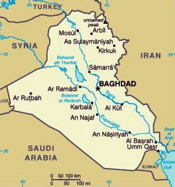The U.S. military's decision last week to release Bilal Hussein, an Associated Press photographer who has been held by U.S. military forces since April 2006 on accusations of links to terrorism, was not just a blow to the U.S. military's case against one prisoner. The announcement by the U.S. military, which followed the rulings of an Iraqi judicial panel granting Hussein amnesty, also raised a question war proponents may not want to answer. Namely, if the sovereign institutions and political processes that the U.S. troop surge was supposed to help foster actually take hold, will the United States respect them? This question highlights the inherent tension between a military occupation that envisions complete freedom of action for a foreign military force in conducting offensive operations and a nation-building exercise that seeks to establish and fortify national and local institutions. The trajectory of the case of Bilal Hussein is a further reminder that the Iraqi government's sovereignty is still limited and that ultimate authority rests with the U.S. military. However, even the limited sovereignty of the current Iraqi government will produce decisions that conflict with the stated aims and goals of the United States, and the frequency of such conflicts will rise as national institutions gain greater capacity and confidence.
Bilal Hussein and the Looming Battle Over Iraqi Sovereignty

